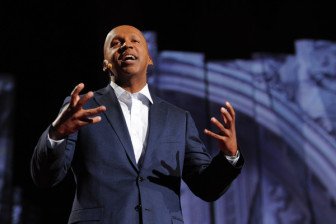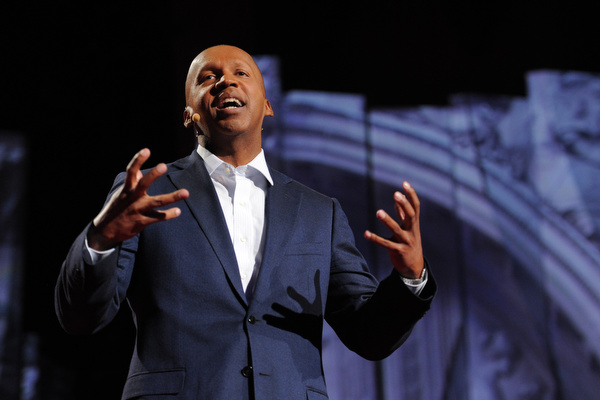
James Duncan Davidson
Bryan Stevenson at TED2012: Full Spectrum, February 27 – March 2, 2012. Long Beach, CA.
ATLANTA — The man who took the fight against life without parole sentences for juveniles to the U.S. Supreme Court said he is optimistic about juvenile justice trends, but said there is much work to do in a few areas, most especially around housing youth in adult lockups.
Bryan Stevenson, executive director of the Equal Justice Initiative in Montgomery, Ala., also said the number of states that try juveniles as adults is a problem.
There are 29 states where kids are routinely put in adult jails and prisons, Stevenson said, and “in a kind of perverse way, kids suffer more than adults in these facilities.”
“You put a 14- or 15-year-old in an adult jail who’s awaiting pretrial, they can’t focus on the trial, they can’t focus on defense, they can’t focus on their family and their attorneys,” he said. “They have to focus on survival.”
Then, if a youth is locked up with adults after conviction on a parole-eligible offense, it’s hard for the young person to build up the kind of institutional history that would win them parole. “These kids have three times the disciplinary problems as adults because they’re the targets of so much assault, abuse and violence,” Stevenson said.
The United States must change its narrative about youths, Stephen said in an address to some 450 attorneys and others gathered at the annual summit of the National Association of Counsel for Children.
Or rather, he said, we muct return to what Stevenson sees as the historical norm of considering children as different from adults and properly subject to different consequences.
It was only in the late 1980s that “we categorically gave up on that for thousands of kids,” he said. During the tough-on-crime years, policymakers nationwide, drawing on a narrative that prescribed punishment for both adult and juvenile law-breakers, cracked down on crime with laws like mandatory minimum sentences and mandatory transfer of certain youth to adult courts.
Supreme Court rulings, like the 2012 pronouncement in Miller v. Alabama, which Stevenson argued, may represent a national shift away from the ‘80s and ‘90s narrative of children as predators, and tough-on-crime punitive laws.
The Supreme Court is “probably ahead” of the rest of society in considering children different from adults, Stevenson said.
EJI, a nonprofit, provides legal representation to both youth and adult indigent defendants and prisoners, especially those whose trials are marked by racial bias or prosecutorial misconduct.

Pingback: Bryan Stevenson Optimistic About Juvenile Justice Trends, But Work Remains | Hope and Voice Journal